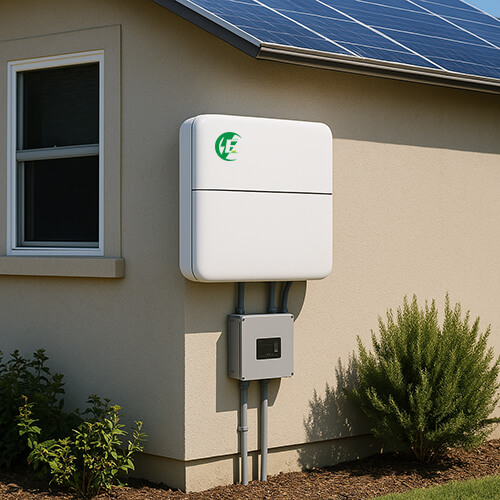How Home Battery Storage Systems Enhance Solar Power Usage
What is Residential Energy Storage and How Does It Work?
Residential energy storage allows homeowners to store excess energy generated by their solar panels during the day for use later, ensuring a continuous power supply around the clock. By combining solar power with a home battery storage systems (BESS), homeowners can store energy produced during daylight hours and use it when needed, even after the sun has set. This system ensures the most efficient operation of your home solar power system, enhancing its overall effectiveness.
In addition to improving efficiency, home energy storage systems also offer reliability in case of temporary power disruptions. These systems react quickly to power outages, providing backup electricity with minimal response times. Furthermore, energy storage systems support self-consumption—the ability to use locally stored energy from renewable sources to reduce reliance on the national grid.
How Does a Home Battery Energy Storage System Work?
The most commonly used home energy storage systems today are lithium-ion batteries. These systems are composed of several key components:
- Battery Cells: Manufactured by battery suppliers and assembled into modules, the smallest unit of a battery system.
- Battery Racks: These are groups of connected battery modules that store the energy and produce direct current (DC).
- Inverter: A device that converts DC output from the batteries into alternating current (AC) for use in household appliances.
- Battery Management System (BMS): An integrated system that controls the charging, discharging, and overall performance of the batteries.

When you connect the system to solar panels, it stores the solar power generated during the day in these battery racks. When needed, the system passes the stored energy through an inverter to convert the power to the appropriate current, then routes it to your home’s electrical system to power essential appliances.
Can Batteries Be Added to an Existing Solar System?
Yes, you can add home battery storage systems to both new solar installations and existing solar systems.As solar power becomes more affordable and popular for its environmental benefits, the demand for battery storage grows. Adding a battery to an existing solar setup boosts reliability and efficiency, ensuring a stable power supply, especially during peak demand or outages.
How Much Energy Can a Home Battery Energy Storage System Store?
Home energy storage systems measure capacity in kilowatt-hours (kWh). Residential systems typically range from 1 kWh to 10 kWh, with the average household opting for a 10 kWh battery. A 10 kWh battery can power essential household items such as a refrigerator, lights, and charging ports. During a blackout, a 10 kWh battery can typically power a refrigerator for 14 hours, a television for 130 hours, or a single LED light for 1,000 hours.
What Are the Benefits of Home Battery Storage?
- Energy Independence: By storing energy generated by your solar panels, you can reduce your dependence on the grid, allowing for greater energy independence. This helps protect you from fluctuating energy prices and power outages.
- Lower Energy Costs: Storing your own solar power means you can use it during high-demand periods, lowering your energy bills and reducing reliance on expensive grid electricity.
- Carbon Footprint Reduction: If your goal is to lower your carbon emissions, adding a battery to your solar system helps maximize your efforts. It enables you to use clean, renewable energy at any time, reducing your overall carbon footprint.
- Increased Self-Consumption: By storing energy locally, you can increase the amount of self-generated energy you consume, minimizing the need to purchase energy from the grid. This is a key part of the energy transition, promoting sustainable living.
- Cost-Effectiveness: Solar power is a free, renewable energy source, and by storing that energy in a battery, you’re investing in a cost-effective way to reduce your electricity expenses over the long term.
Conclusion
Home battery energy storage systems (BESS) are transforming the way we use and store energy. By storing solar energy, these systems enable homeowners to reduce reliance on the grid, lower energy costs, and contribute to a more sustainable energy future. As the cost of solar energy and battery storage continues to drop, more homeowners are adopting these systems to achieve greater energy independence and reduce their carbon emissions.
Ready to make your home more energy-efficient and sustainable? Explore our battery storage solutions to get started on your journey to energy independence.

